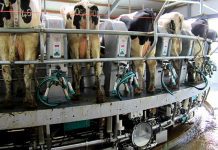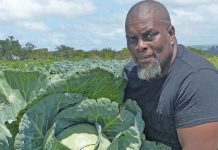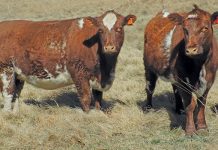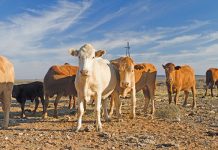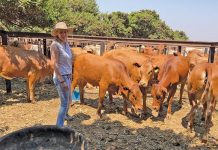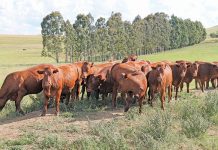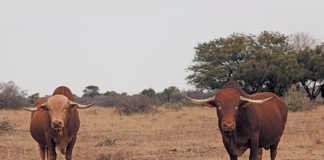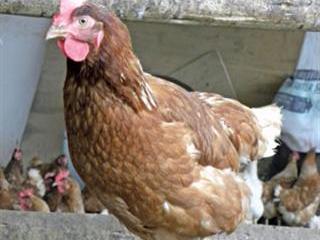
Four years ago, city slickers Chris and Kandy Slater bought the 10ha Croft Farm in the Dargle Valley of the KwaZulu-Natal Midlands. Once a thriving poultry farm and butchery, at the time of purchase the live chicken division had been completely wound down and whole fresh chickens were being brought in to supply the butchery.
This didn’t concern the Slaters. With no experience, and no intention of farming, their dream was to move to the country and use existing buildings to set up Chris’s plastic injection moulding business and a wedding venue. “We bought the chicken enterprise as a going concern and for tax reasons we kept it running. After four months we re-introduced live chickens. Four years later we run a fully-fledged chicken farm, and still have no wedding venue,” says Kandy, the businesses’ administrator and bookkeeper.
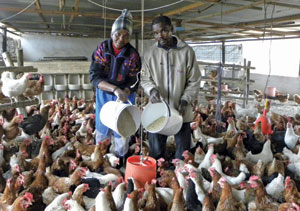
Irene Moshoeshoe and Themba Msomi at feeding time in the layers’ house. The farm employs 14 people.
The Slaters have increased chicken supply numbers to 1 000 free-range broilers a week. They also have 1 000 free-range layers with another 1 000 added in September. By mid-2013 they plan to add 1 000 more. There are six broiler houses on 1ha and two layer houses on 1,5ha. “Layers use a lot more space and have access to a 1 500m² field. The broilers have access to outside pens of about 80m² to 100m². Broilers go outside only after they are fully feathered,” says Chris.
Croft chickens are free- range, not organic. “We do natural chickens. They are grain fed and don’t get growth hormones or animal by-products. Antibiotics are not routinely administered, but if faced with a major disease challenge, we would use them if necessary. So far we have not needed to,” he says.
“We get our day-old chicks from Stonor Farm and Keystone Hatchery and the point of lays from Inverness Rearers. Chickens are kept healthy with vitamins and a scheduled vaccination programme. “To reduce the risk of stress and disease, we use a multivitamin pack when temperatures are extreme. The fact that our stocking densities are relatively low, at about 7 birds/m², is another stress reducer. Our birds get fresh air and sunlight, which helps with their general well-being. We feed layers greens such as lucerne and cabbage to improve the yolk colour.”
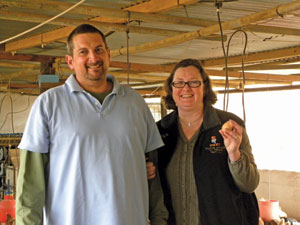
Chris and Kandy Slater bought Croft Farm as a going concern and have rebuilt the live bird division.
Broilers are grown out to order, with the farm specialising in jumbo-sized birds. Their standard whole chickens are larger than normal at an average weight of 1,5kg to 2kg (at 6 to 7 weeks). Jumbo chickens range from 2,3kg to 2,8kg (8 to 9 weeks). They also produce baby chickens at an average of 650g, and extra Jumbos for Christmas at around 3kg.
“We needed to produce for a niche market, which gives us a better price. It makes sense for us to get more rands per pack than to produce more chickens, so we are trying to push up the average bird weight,” says Chris. Even so, margins are tight. “The price of soya beans increased from R3 200/t to R6 470/t in three months and maize is already quoted at over R3 000/t. We are nervous of putting our prices up because we don’t know what consumer reaction will be. We held prices for 16 months but in August we had no choice but to increase them.”
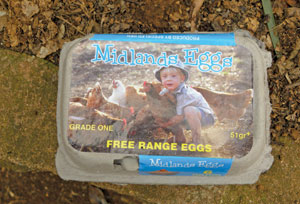
Croft Farm produces just under 1 000 free-range eggs a day, which should double when 1 000 new layers come into production in October. The eggs are supplied to Midlands Eggs, a marketing and distribution platform for smaller producers, owned by Dave Teichmann and Derek Ross.
Winter is a challenging time as an additional R8 000 a month is spent on gas to heat the houses. Chickens also eat about 15% more and take longer to reach slaughter weight. “We are looking at new ways of saving, such as mixing our own feed and experimenting with live worms and sprouts,” says Chris. The past four years have taken this couple through a steep learning curve. In their first winter, they lost hundreds of chickens because they kept them too warm which compromised lung development.
“That first winter was tough. We had high mortalities in one flock and the production chain was broken. We couldn’t supply orders and lost money big time,” says Chris. While this is not an easy game, the Slaters have been buoyed by the support of the local community. “You have to listen to people when you are new to farming. Farmers generally want you to succeed and are generous with advice. They possess generations of knowledge.”
Contact Croft Farm on 082 558 0497 or 082 339 8892 or email [email protected] or www.croftfarmchicken.com

